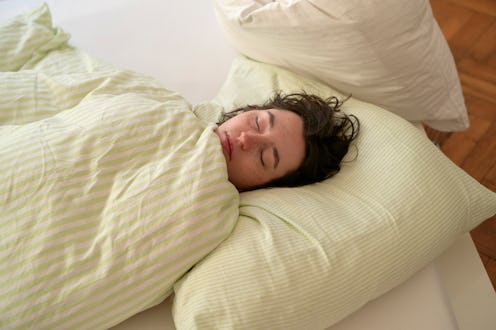Wellness
The “10-3-2-1-0” Sleep Hack Will Reset Your Nighttime Routine
It’ll set you up for snooze-filled success.

Most people kick off their pre-bed routine an hour or so before they plan to sleep. That’s when you might watch a comfort show, sip some tea, do your skin care, and try to wind down. But according to experts, the best sleep routines actually start 10 hours earlier.
That’s what the viral “10-3-2-1-0” sleep hack is all about. It suggests you should stop drinking caffeine 10 hours before you plan to go to bed. It also recommends that you stop eating three hours before bed, banish work-related thoughts two hours before bed, and ditch screens an hour before bed. If you do all of that, you should be able to hit snooze zero times in the morning: 10-3-2-1-0.
According to Dr. Nicole Moshfegh, a licensed clinical psychologist, sleep specialist, and author of The Book of Sleep, this is a simple way to remember the basic principles of good sleep hygiene, aka all the habits you follow in the evening to ensure you get enough rest.
“It packages the rules in an easy-to-remember format, which can be helpful for people who like structure or may be new to thinking about how daytime habits affect sleep,” she tells Bustle. Here’s what to know about the 10-3-2-1-0 hack, so you can set yourself up for snoozy success.
The 10-3-2-1-0 Sleep Hack
If you feel like you “do everything right” before bed and yet still struggle to sleep, it might help to start your routine earlier. The 10-3-2-1-0 hack isn’t about actually getting ready for bed at 1 p.m., but about being more aware of common habits that make it difficult to snooze. Here’s what to keep in mind.
No Caffeine 10 Hours Before Bed
According to Moshfegh, caffeine has a pretty long half-life of about six hours, meaning it lingers in your body long after you drink it. “For sensitive sleepers, slow metabolizers, or those with insomnia, afternoon caffeine can meaningfully delay sleep or disrupt sleep quality,” she says.
If you typically start your day with matchas or iced coffees, try to have your last one — or switch to decaf — by around 1 p.m. “Ten hours is a conservative buffer, but reasonable for anyone struggling with sleep initiation,” she says. “I usually just remind people to try to avoid caffeine after lunch as an easy rule of thumb.”
Last Meal 3 Hours Before Bed
While there’s nothing wrong with a light snack before bed, it’s a good idea to plan dinner so that you’re done eating about three hours before bed. That way, you’ll have enough time to digest.
“Eating too close to bedtime can contribute to reflux or digestive discomfort — and it can activate the system at a time when the body is trying to wind down,” she says. “Not everyone needs a strict three-hour cutoff, but a buffer supports more consolidated rest.”
Stop Work 2 Hours Before Bed
Even if you really want to check your email one last time at 9 p.m., resist the urge. According to Moshfegh, responding, planning, and problem-solving wake up your brain and make it difficult to transition into sleep mode.
A buffer of at least two hours allows your nervous system time to shift from that active, alert state to one that’s more relaxed. By putting work aside, you might also be less likely to wake up with racing, work-related thoughts at 3 a.m., Moshfegh says.
“If two hours is too difficult, I have people start with 30 minutes and work their way up to two hours,” she adds. “Some people may need less time, and some people may need more.”
No Screens 1 Hour Before Bed
Even though it feels so nice to scroll in bed, it isn’t as relaxing as you might think. “Screens affect sleep in two ways: bright light can delay melatonin release, and stimulating content can keep the mind activated,” Moshfegh says.
It’s why so many sleep experts recommend reading, listening to music, or doing a fun craft instead of scrolling, catching up on the news, or watching a tense movie. “Without some reduction in screen use, people often feel wired at bedtime or notice their sleep schedule drifting later,” she says.
If you really do feel comforted by your phone, make sure you watch something slow, quiet, and soothing.
Wake Up Without Hitting Snooze
If you follow the 10-3-2-1-0 sleep hygiene routine, you should find it easier to wake up in the morning — and actually feel refreshed. “Better-aligned habits can improve sleep quality and make waking feel less abrupt,” she says, meaning you might not need multiple alarms.
To make it even easier, Moshfegh recommends getting up at the same time every morning and going to bed around the same time, to set your biological clock. As a bonus, “avoiding the snooze button prevents the sleep fragmentation that often leads to morning grogginess,” she says.
Is The 10-3-2-1-0 Hack For You?
According to Moshfegh, you’ll benefit from the 10-3-2-1-0 method if you struggle to fall asleep, have irregular sleep habits, or tend to feel overstimulated in the evenings. It should help you feel more relaxed and ready for bed so that you fall asleep more easily and sleep through the night.
That said, there’s no need to be too rigid about the timing. If you forget and have a latte nine hours before bed or occasionally need to check one last email, that’s OK. “Sleep routines work best when they are adapted and not forced,” she says. “We ideally want the focus to be on consistency rather than perfection. The goal is to create supportive habits, not to add pressure.”
Source:
Dr. Nicole Moshfegh, licensed clinical psychologist, sleep specialist, author of The Book of Sleep